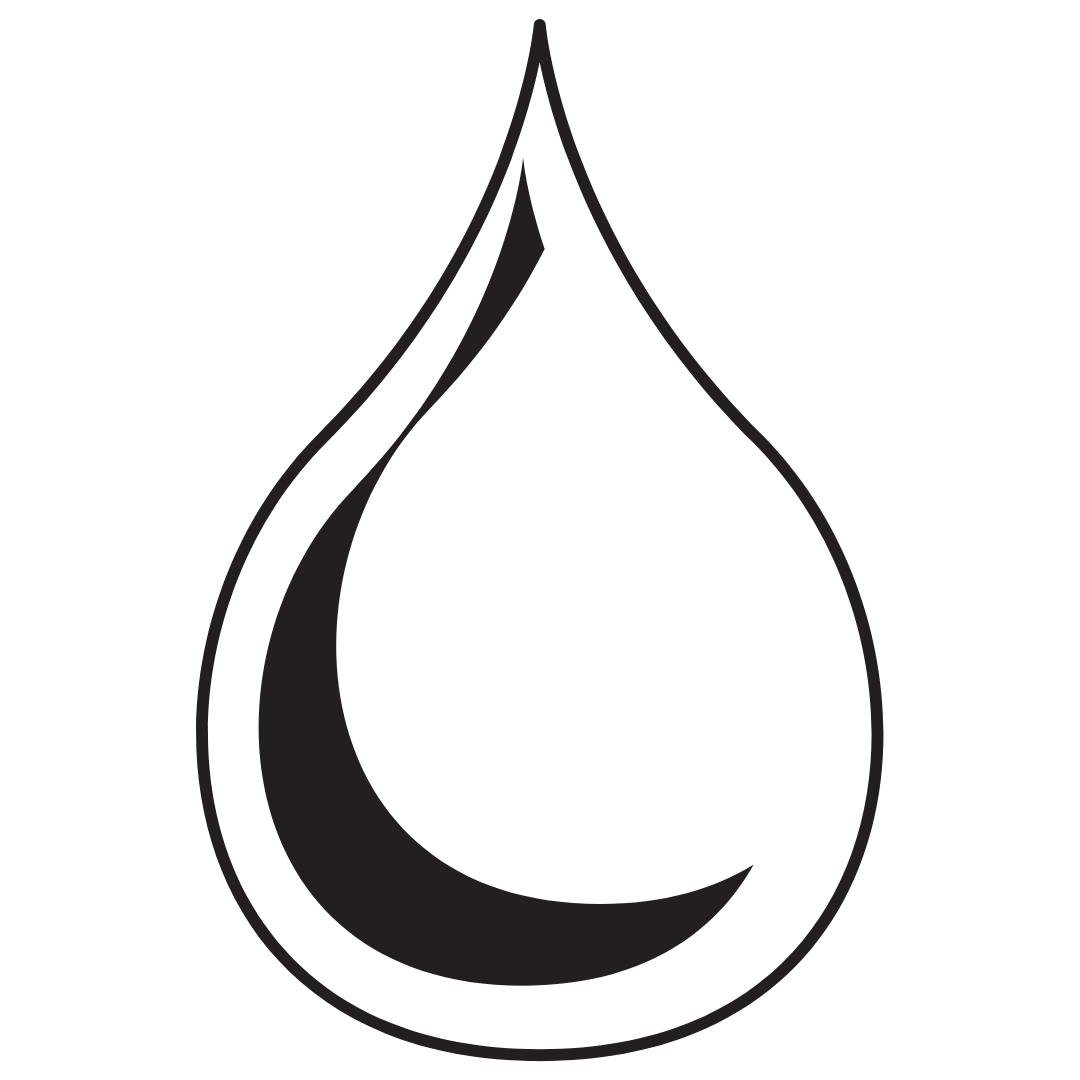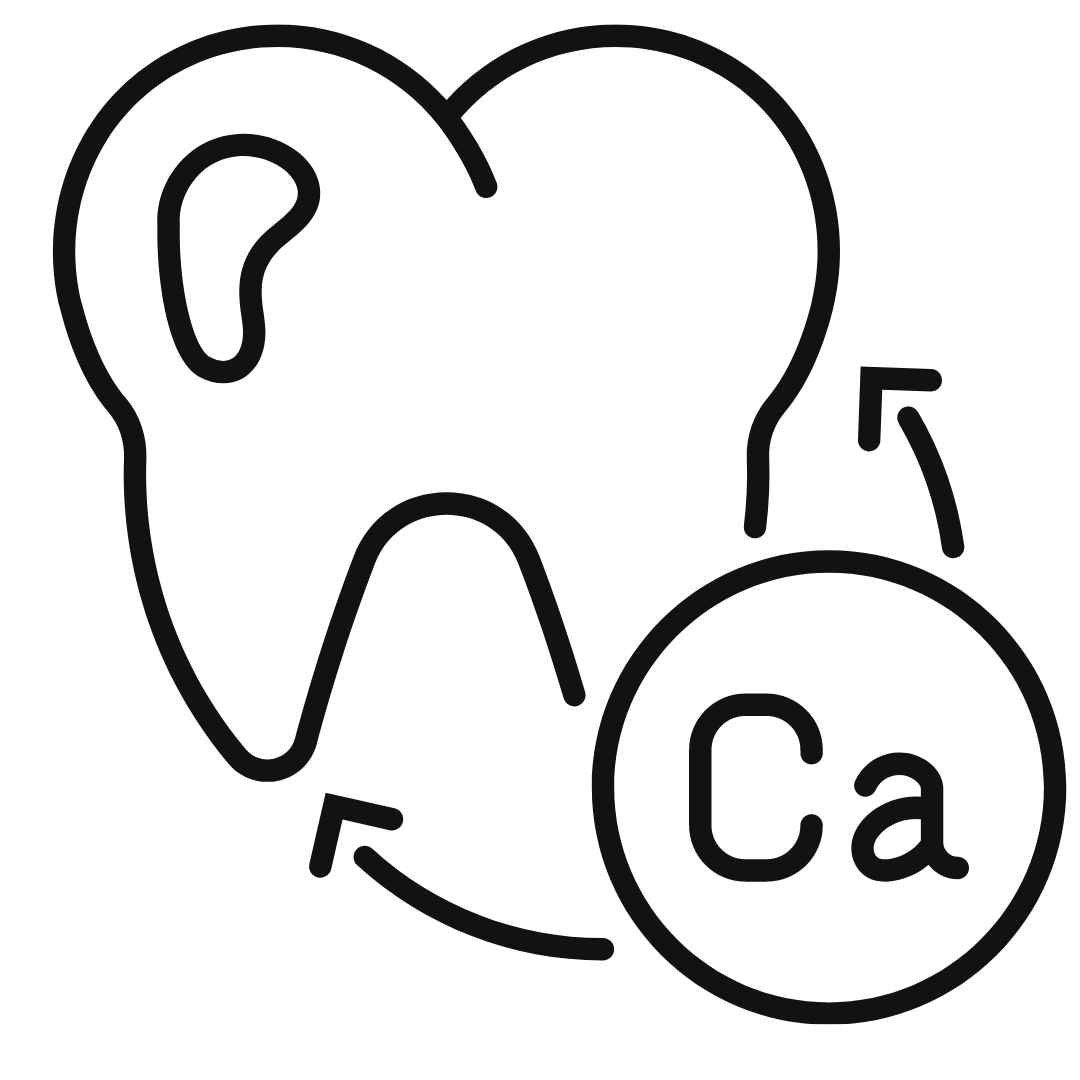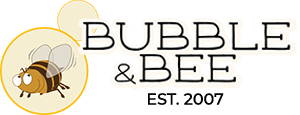Bubble & Bee Alkalizing Toothpaste LEMON
You'll feel the toothpaste alkalizing your mouth. After a decade of testing and developing, we've managed to make an alkalizing soap-based toothpaste that doesn't *taste* like soap. And while it doesn't taste like soap, it *feels* like soap. You'll feel the alkalizing sensation when you use the toothpaste. It's a little zing to wake your mouth up.
Description
Bubble & Bee Alkalizing Toothpaste
More than a decade in the making! Formulated based on years of research and product testing. Finally a toothpaste that’s safe, effective, and even edible.
No nanoparticles, no fluoride, no SLS, no GMOs, no titanium dioxide.
(Please see our return policy, we do not accept the return of opened items.)
Ingredients
 Organic vegetable glycerin
Organic vegetable glycerin
Proudly chosen for its bacteriostatic and anti-cariogenic properties. Known to stop the growth of the bacteria that cause cavities. (More info here) It also makes the toothpaste a paste; without glycerin, the product would just be a hard chunk of soap. Our glycerin is palm-free, gluten-free, produced without hexane, non-GMO, organic, and USP grade.
 Saponified organic coconut oil
Saponified organic coconut oil
AKA coconut oil soap, this is the powerhouse of the toothpaste. This is what gives the toothpaste a mild lather, lifts debris from teeth, and gives the toothpaste its alkalinity. In an alkaline state, the mouth has a chance to naturally remineralize. If your mouth is below 5.5 pH (acidic) the calcium and phosphorous in your enamel start to dissolve in your saliva, leading to acid wear and promoting bacterial growth.(Source) But when your mouth’s in an alkaline state, the calcium and phosphorus ions in your saliva are able to bind to the hydroxyapatite in your teeth. You *can* remineralize without the help of nanoparticles and fluoride. Alkalinity is the key.
 Calcium carbonate
Calcium carbonate
It’s so important to use a toothpaste with a LOW abrasive factor. Many toothpastes are so abrasive that they wear the enamel right off your teeth. It might feel good to really scrub and feel like you’re leaving the dentist’s office every time you brush your teeth, but abrasive toothpastes wear enamel and cause sensitivity and damage. We use a *small* amount of naturally-sourced calcium carbonate to help clean and polish teeth but not strip enamel.
Calcium carbonate also assists in alkalizing the mouth, and can increase the levels of calcium in the saliva. (Source)
 Organic lemon essential oil
Organic lemon essential oil
Wait, isn't lemon acidic? The juice is, but the essential oil isn't! Only water-soluble compounds can have a pH. Lemon essential oil has actually been found to aid in the remineralization process (source) and has been studied for its antibacterial and antioxidant properties. (source)
 Organic stevia
Organic stevia
Whole-leaf extract, no chemical solvents or additives. With this toothpaste being soap-based, we needed something to keep it from *tasting* like soap. After reviewing and testing all non-cariogenic natural sweeteners (like xylitol and erythritol) we felt confident in our choice for organic stevia. No digestive side effects (like some sugar alcohols) and no worries about furry friends getting sick. But not just that, stevia has been shown to have anti-plaque properties. (Source) We also love all the studies that have found it to have antioxidant properties, so you can feel safe you’re using only clean and healthy ingredients. (Source)(Source)
And that’s it! That’s all the ingredients. No “featured ingredients” in a big font, then a hidden menu with the full ingredients in fine print that reads like a chemical catalog. This is it!
Full Ingredients List: organic vegetable glycerin, saponified organic coconut oil, calcium carbonate, organic lemon essential oil, organic stevia.
Packaging
Comes in low-waste packaging! Glass jar with recyclable metal lid. Sealed with a biodegradable sticker. Add on an optional bamboo scoop for handy use. Bamboo scoop found here.
How do I use it?
If you're sharing a jar with other family members, you can use a scoop to apply your toothpaste to your toothbrush. If it's your own jar, you can just dip your toothbrush right in. Apply a half a pea-sized amount to a wet toothbrush. You don't need a huge ribbon, a little goes a long way. Brush teeth thoroughly. Toothpaste is low-foaming so you won’t get a mouthful of bubbles, but you will get some. Rinse and spit, repeat if desired. Scoop sold separately.
Size
Is it good for sensitive teeth?
YES! Tooth sensitivity can have its roots, no pun intended, in several things. Using a toothpaste with too much abrasiveness, acid wear, over-brushing, and using a toothbrush with a higher abrasiveness factor. (Those toothbrushes with the rubbery bristles are a big cause of tooth sensitivity, from personal experience. I got rid of those brushes and got rid of most of my sensitivity.) Keeping your mouth in an alkaline state opens the door to remineralization. Calcium and phosphorous in your saliva have the chance to bind to and thicken and heal your enamel when the mouth is in an alkaline state. When the pH drops below 5.5, the pathways change and calcium starts to dissolve in your saliva from your teeth. Keeping your mouth alkaline is essential to reducing sensitivity and building your enamel. (Source)(Source)
Is it safe for kids?
Why doesn't it contain fluoride or hydroxyapatite?
Keeping the mouth in an alkaline state is the key to natural remineralization. However, if you're taking medications that deplete calcium, have a medical condition where calcium or other electrolytes are imbalanced, are nutrient deficient, or have certain genetic factors that would lower the calcium and phosphorous in your saliva, you may need to artificially remineralize/strengthen your teeth through certain dental treatments such as fluoride or hydroxyapatite. These treatments should be considered medical treatments; talk to your doctor or dentist about what options are right for you and weigh the benefits vs. the risks. If your body is properly nourished and healthy, and your mouth is kept in an alkaline state for the majority of the time, the ions in your saliva should be enough to keep your teeth healthy without the need for artificial remineralization.
Is it safe during pregnancy?
Will this make my mouth peel?
Is this a whitening toothpaste?
No! And yes! Let me explain.
There are two causes for teeth yellowing: staining and enamel wear.
Staining is self-explanatory. Pigments from foods stick to the enamel and cause discoloration. Enamel wear can also cause yellowing. The dentin (the layer under the enamel) is yellow, so if your enamel is thin, the dentin will be more visible, causing a yellow appearance to your teeth.
Whitening toothpastes work in various ways.
Some whitening toothpastes contain a chemical called blue covarine. Blue corvarine is a pigment that adheres to the surface of the tooth; the blue hues cancel out the yellow in the tooth, giving them a whiter appearance. Obviously we don't use blue covarine because it's a synthetic chemical, and that's not what we're about.
Other whitening toothpastes might contain hydrogen peroxide, which bleaches the enamel of the tooth. H202 is able to “bleach” the enamel through the formation of superoxide anions (O2- ions). Researchers have recently found that these superoxide anions can reach inside the tooth and get in to the pulp. Here, they have been found to kill a special type of cell called odontoblasts–-the cells in the pulp responsible for creating dentin. Without odontoblasts, the tooth can’t repair itself and is at a higher risk for decay and sensitivity. While a one-time treatment with H2O2 may not have a big effect, as the cells are able to replenish themselves, using hydrogen peroxide on a daily basis is suspected to cause a constant barrage of damage to odontoblasts and may affect dental health negatively. Even low concentrations have now been shown to permeate the enamel and dentin, affecting the pulp of the tooth. (more info on this here) Hydrogen peroxide is actually allowed in a certified organic product, and we could probably make more money by selling a "whitening" toothpaste, but we wouldn't feel good about it. Using an ingredient that makes teeth "appear" healthy but damaging the tooth on a cellular level is contrary to our mission.
The third way that "whitening" toothpastes work is by having a high abrasiveness factor. The abrasiveness tackles surface stains on teeth to whiten them. However, this high abrasive factor isn't healthy for daily use, as once the surface stains are removed, the abrasive particles start to scrape the tooth's enamel. Think of it like sandpaper on your teeth. At first it'll work to whiten teeth, but as your enamel wears down, the dentin will start to show through, leading to more yellowing on top of sensitivity that may not be able to be reversed naturally. Charcoal toothpastes fall into this category, being highly abrasive. (Source)(Source) Our toothpaste is a LOW abrasive toothpaste, formulated for daily use with the health of your teeth in mind, so it will not attack surface stains (and your enamel) the same that a "whitening" toothpaste would.
Our toothpaste doesn't contain any of these damaging "whitening" treatments. We believe that a toothpaste should be formulated with the health of teeth and oral mucosa in mind, first and foremost. A toothpaste should be healthy and safe for daily use.
That being said, over time, if you're continually alkalizing your mouth and are able to repair and replenish your enamel, the enamel can thicken and whiten over time if your yellowing is caused by enamel wear exposing the yellow color of the dentin. So, in that way, it can function as a "whitening" toothpaste.
What about allergens?
Our toothpaste is:
- Corn-free
- Gluten-free
- Vegan
- Palm-free
- Soy-free
If you have any other allergy or sensitivity concerns, please contact us and we'll be happy to help!
What about my gums?
Does this toothpaste freshen breath?
Product Texture Will Vary
We recommend our summer shipping with this item, as it can melt in transit.
Separation will occur, but the product is still totally usable either way. Texture can harden or separate over time. This doesn't affect the effectiveness of the toothpaste. In humid climates, the glycerin might absorb some of the moisture from the air, leading to product "sweating." This will not affect how the toothpaste works. Store it tightly capped to avoid this.
[Information provided for educational purposes only. This product is not a drug and cannot prevent or treat any medical conditions.]
38 Reviews
-
Kids paste!
My son absolutely loves this toothpaste! It tastes sooooooo good!
-
Love it!!
Great toothpaste! My kids like the lemon flavor too! I’m a new customer, but so far very impressed with bubble and bee products!! And super fast shipping!
-
Lemon Toothpaste
Thank goodness I read the comments. Lemon seemed like such an odd choice to my minty toothpastes I usually buy. Oh my stars this is fantastic. The taste is great, and gets the teeth etc so clean. The little spatula works really well. I hope it is back in stock soon. I don't want to be without this. :) It does separate a little but the spatula is a perfect mixer. ;)
-
Lemon toothpaste
I'm teaching my 2 year old to brush his teeth and he gets so excited and says lemon! I'm glad it's safe because he shallows it and never spits it out. At least I'm getting him I to the habit of "brushing" his teeth haha
-
This toothpaste is great!
I have used this toothpaste and I love it! When I first used it my teeth were hurting and after about a week of using it, my teeth stopped hurting. The taste of the lemon toothpaste is so yummy. I used to be able to floss between my teeth pretty easily, but the floss seems to be getting quite a bit and it’s harder to get into the spaces, with that being said, it’s definitely remineralizing my teeth and making them stronger than they were before.
-
Great flavour and cleaning
The whole family enjoys this toothpaste. The kids decided that they like it more than the mint. Awesome stuff in a little pot.
-
Tastes like lemon meringue pie!
I love the taste of this toothpaste so much that I actually look forward to brushing my teeth now, instead of it being such a chore. My kids think the lemon is too strong, but they are toddlers and are sensitive to strong flavors. If you love lemon, you'll love this! It also seems to clean my teeth well. And the healthy, minimal ingredients are fantastic!
-
Alkalizing Lemon Toothpaste
While I had already been using the Alkalizing Spearmint Toothpaste and quite liked its fresh feeling in my mouth and its whitening effect, I decided to try the Lemon flavor, as well. Its flavor is very lemony and is a nice change of pace from all the mint varieties. I recommend trying it.
-
LOVE this flavor
This is such a nice change from mint flavored. Using this encourages my boys to brush longer too. Like me, they don't care for mint flavored anything. Please don't stop making this!
-
Toothpaste
love, Love, LOVE! I use the lemon in the morning & peppermint at night. Would be great if you could produce biodegradable refills for the glass jars.
-
Highly Impressed
Being new to using more natural products, we were skeptical about trying this and shocked by how much we love it. The toothpaste is everything it's advertised to be (maybe better). We tried all 3 flavors, and they're all great and leave your mouth feeling fresh and clean. The adults in our house like peppermint best, and all the kids love the lemon. Things we love: how clean our mouths feel (we find ourselves wanting to brush our teeth more often), how little you need, using the bamboo scoop, we aren't worried about using it with our young kids (who refuse to spit instead of swallowing), there is no toothpaste glob mess on the counters, and we love the glass containers (no more trying to squish the last bit out of the tube!). Before buying, we noticed some reviews said they have more saliva/drooling using this. We haven't noticed any issues with that in the month we've used it. If anything, the level of saliva is simply more noticeable without all the extra "foam" covering it up. We recommend this to everyone and hope they make this toothpaste forever.
-
Perfect change from mint!
I absolutely LOVE this flavor! I'm not a fan of mint so I was so excited to see this. The taste is a perfect lemon flavor, it leaves my mouth feeling clean without that minty taste that I'm not a fan of. If you're tired of mint, you have to try this! Your mouth will still feel clean. This is a keeper!
-
My favorite
I tried all three flavors of toothpaste here and found that this is my favorite. I love that it is lemon! When I used to brush my teeth with all the non-organic, fake mint toothpastes, the overwhelming fake mint numbing would make me feel like I couldn't enjoy the taste of food again. With Bubble & Bee toothpastes, my mouth feels fresh and my teeth clean, and my taste buds are still intact. I actually find myself wanting to brush my teeth even more than I used to throughout the day.
-
This is amazing
I absolutely love this toothpaste! OMG, the flavor is wonderful! It does a great job of cleaning my teeth. I so look forward to using it. All of Bubble and Bee's toothpastes are great, but this one is my hands down favorite! Thank you so much for another truly CLEAN product!
-
Toothpaste
I just received the lemon and peppermint flavored toothpaste, last week. So far I have been using the lemon flavor. I am quite impressed, the toothpaste feels good in your mouth and my mouth also feels clean. I like this toothpaste!! Thank you for making it!!
-
It Tastes Like Lemonade
If you like lemonade, you'll probably love this stuff.
-
Best
Thanks so much for making the lemon flavor toothpaste ! I think it’s the best tasting & most mouth freshening toothpaste I’ve ever used in my life ! Been using healthier toothpastes since getting cancer & other health problems years ago & when Earthpaste went nano I couldn’t find anything I liked . This is so superior to anything I’ve tried , not just for freshening but for a safe , healthy toothpaste. Thanks for all the work you put into it . Looking forward to seeing how it does over time .
-
Lovely Lemon Toothpaste
What an amazing toothpaste! So inventive, clean Ingredients, fun, fresh, zingy. I like that this toothpaste is offered in a flavor other than the typical mint. The lemon flavor is bright, peppy and wakes me up. So easy to use, super travel friendly, low foaming bubbles but that's okay. Works very well, my mouth feels very clean, need very little to brush so this jar should last me a long time. HIGHLY RECOMMEND this product! Thanks Bubble & Bee for all the hard work that went into creating this natural toothpaste!














